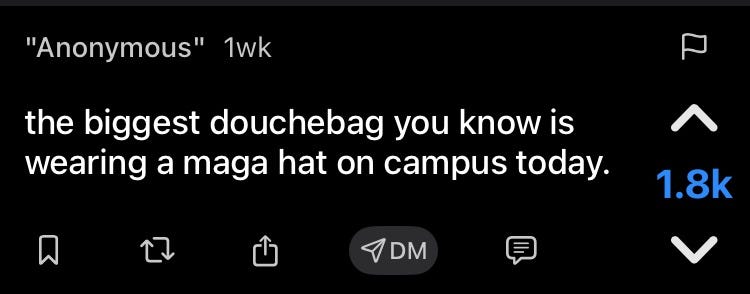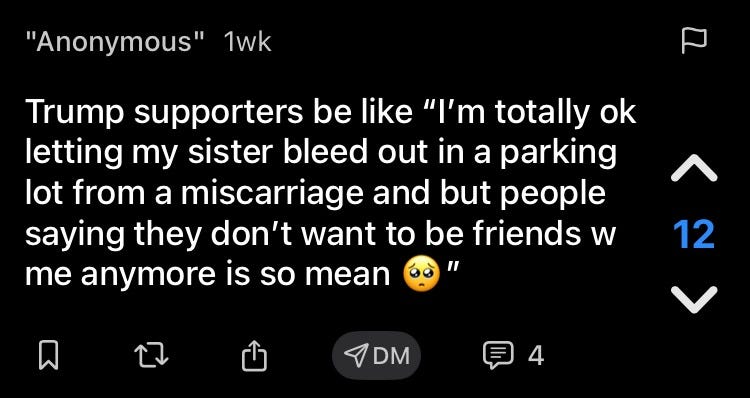
The Free Press

This editorial was originally published in Publius, an organization of Yale University undergraduates that pens joint op-eds on a range of topics. This piece was published with the approval of at least two-thirds of the group’s members.
We exist in a very progressive space. In a survey of our peers, the Yale Daily News found in October that 82 percent of respondents intended to vote for the Harris-Walz ticket. The divide is larger among the faculty: 98.4 percent of professors’ political contributions went to Democratic-affiliated entities in 2023.
Meanwhile, conservatives are confined to a glum minority. We hear often about how they have it tough, facing ostracization, mockery, and pressure to conform. There may be some truth to this, but we don’t pity our conservative peers.
In fact, we envy them.
While liberal students are cushioned by a sense of majority, conservatives must grapple constantly with difficult questions. They are forced to interrogate their own beliefs in ways their liberal peers need not. It’s challenging, but it cultivates resilience, critical reflection, and the capacity to find community amid disagreement.
At Yale, conservatives are forced to square their opinions with the progressive supermajority. They emerge from college better versed in left-wing ideas than when they entered, whether through posters around campus or Instagram infographics. Conservative viewpoints, on the other hand, are more hidden from the public eye, relegated to spaces like the Buckley Institute or the Federalist Party. Outside these institutions, exposure to conservative voices requires more effort.
In Yale classrooms, sweeping statements like “healthcare is a human right” are unlikely to provoke debate. Liberal students can get away with the minimal nuance that accompanies these slogans because their arguments fall within our school’s political orthodoxy. Our conservative peers are not afforded the same argumentative safety net. In anticipation of left-wing pushback, they must frame their contentions precisely and gracefully. This pressure to defend unpopular ideas is a catalyst for intellectual growth.
We believe this benefit extends beyond the classroom—conservatives will likely graduate better equipped to defend liberal ideas than liberals themselves. Far too often, students strawman complex ideologies without making an effort to understand the nuances of the opposing perspective. If conservative students took advantage of the many classes, clubs, and voices discussing theories of the left, they would be able to more accurately critique them. For liberal Yalies, however, there are far fewer opportunities to become well-versed in conservative ideas.
Of course, we don’t want to oversell the amount of conservative engagement in Yale classrooms. Imagine the average Ethnicity, Race & Migration class—it’s likely bereft of right-leaning students. Maybe they’re uninterested, or perhaps they’re afraid of grade penalties for speaking up.
As students from across the political spectrum, we oppose echo chambers on both sides. Yale’s marketplace of ideas stands to be improved, and ad hominem attacks are far too common in our current political landscape. These retorts can transform a classmate into a political rival, flattening his character into a series of defamatory epithets. Some may assert that such conduct is absent from Yale’s intellectual bubble, but this seems a difficult position to maintain. Anonymous attacks against Trump supporters on Yale’s Fizz feed serve as a reminder that many of our peers are hostile to dissenting voices.
To break out of this bubble, ideologically curious students need to try a little harder. They have to overcome the temptation to generalize on the basis of a few interactions. Good faith engagement with the other side requires self-reflection and humility. We implore you: Assume that all individuals—not just those with whom you share a connection—do not harbor ill will. Discuss controversial ideas with friends whose opinions diverge from your own. And if all of your friends share your political views, make some new ones.
Comfort in politics is dangerous. Intellectual growth demands healthy conflict in the form of real, meaningful discussion, not self-congratulatory arguments or Twitter wars with faceless foes. It matters how and why we choose to interact. Let us all strive to feel as challenged as a conservative student navigating Yale in a sea of left-wing peers.
For more on the political climate of college campuses, read Frannie Block’s piece, “With Trump’s Victory, Schools Offer ‘Post-Election Wellness Spaces’. ”
To support The Free Press, consider becoming a paid subscriber:






